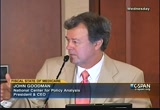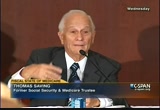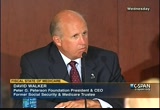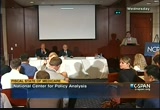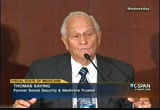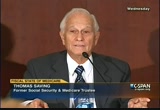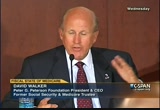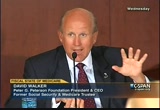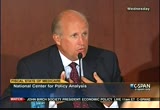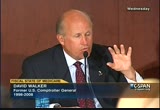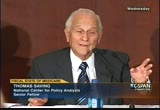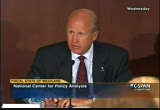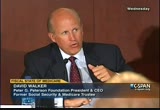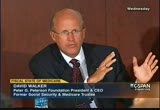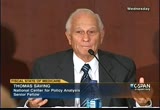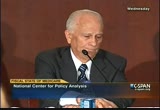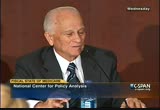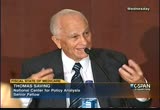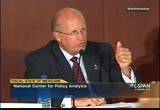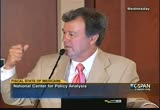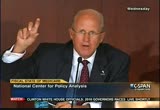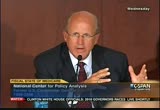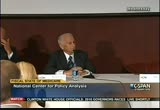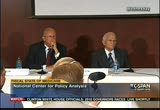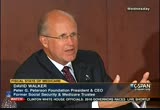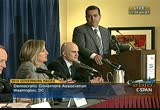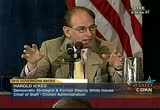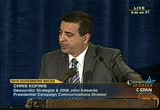tv U.S. House of Representatives CSPAN September 9, 2010 10:35am-12:07pm EDT
10:35 am
important, for tens of millions of americans, we need to make sure that we strengthen them in a way that they are sustainable over time. with a huge problem with regard to state and local pensions and retiree health costs, a trillion dollars of unfunded promises there that ultimately represent a contingent liability that has to be dealt with. in fact, believe it or not, when you look today and at total public debt held by the federal government, the state governments, and local governments and you compare that to comparable levels of debt for european nations, we are already worse than spain, portugal, ireland, the united kingdom, more than 10 years of greece and if you count the amount we owed to social security and medicare,
10:36 am
we are within three years. i am talking about the debt held by the trust funds, not the off- balance sheet promises which represents the real challenge. thank you very much and i look forward to your questions. [applause] >> do we have questions for these two experts? maybe i will lead off with one par. if we implemented the affordable health care act the way it is written and we reduce spending on seniors and disabled by $2,300 per person by 2020 and $3,800 by 2013, what do you think their health care will look like? either -- >> what will have to happen is one of two things.
10:37 am
we will have much longer lines and much more difficulty getting. care i think we will have more seniors in the er which is where people run. even though you are in short, if you cannot find a position to take a. view i think we will say provisions change in the way health care is provided for medicare. i would envision medicare and the hospital would replace semi private rooms withwards. you just have a lot of company. that is one way to make things cheaper is to make it more like a one-star instead of a five- star hotel. the other issue will be long lines waiting. people may leave those lines as they do in canada because they cannot survive the line. that is what i can see
10:38 am
happening. >> i think we need to think outside the box. we don't do that and nothing government. in my personal of view, i think the federal government may well be in the wrong business with regard to health care. one of the things we need to have a discussion and debate about is what level of universal coverage is appropriate, affordable, and sustainable over time. in my view, that is preventative wellness and catastrophic protection with an option to obtain more if you want. i think we need to think about how we can end up moving toward a system that is more appropriate, affordable, and sustainable while maintaining competition and the ultimate delivery to the private sector because right now the system we have now, we have made more promises than we will be able to deliver on. that is the simple truth. >> you see a lot of projections
10:39 am
of future medicaid and medicare costs. it seems there should be a largererror bar because you know the formula. you don't know how medical technology will work out over the next 75 years or so. can you talk about the potential tax what about the variability? have you come up with estimates like that and what might be a reasonable range? >> you are correct that the huge changes in medical technologies may come along. we may have star trek madison. we are looking at a long run trend. we have 60 years of evidence of how bad people have been. we have increased the demand
10:40 am
for health care. we have huge amounts of medical technology changes over that period of time. you have diseases like pneumonia that used to kill people and now you take a few pills. we have had all these changes and that has not changed the fact that health care -- when we are wealthier, we want to consume more health care. we want to stay healthier. we're willing to pay for it and replace body parts. when you get old, you are replacing these body parts. we have not been able to control that because no one is paying for it. if individuals were paying for it, it might look different. with 60 years of consistent growth, i think we are projecting that time and saying magic will not happen in the next 60 years. we would say the variances small parade you are absolutely
10:41 am
right that we do not know what will happen in the future. i think it is largely about incentives. if we are structuring the incentives, we are not making the providers -- we need to take medicare advantage and give people premium support and make medicare all medicare advantage and go out and let them bid to get the customers instead of us telling them what we will pay them. make them bid and let us get everything the partd did for us in competition and make that work. that is where innovations will come from i agree that we do not know what will happen in the future but 60 years of health care growing faster than the economy would give us a good idea that will continue to do that as we become wealthier and wealthier a >>. you are correct that there is a higher degree of uncertainty with regard to medicare than
10:42 am
there is social security because social security looks at democrats and what is likely to happen to inflation, real wage growth. when you're dealing with health care, you are talking about what will health care inflation be? there are some people that think these assumptions are overly optimistic not because of changes but because of the health care reform act but also because people may live longer. that is good news but on the other hand, they will probably use more health care over time. one thing is that you need to understand there is a low-cost, high cost, and a best estimate assumption. there are three estimates done force also security and medicare. there is a broader range because of that. even on a high-cost assumption with medicare, they assume there will be a level off of how
10:43 am
health care costs will grow and it relates to the overall economy. you will not be able to make changes in the long term cost trend pattern unless you make fundamental changes on one of several dimensions. the level of coverage, the incentives, the transparency, and the accountability. if you do not make fundamental challenges on one or more of those dimensions, you will not bend of the cost -- health care cost curve down. >> the more variable your health care estimate is, the worse it is. you may have underestimated what you can expect to pay. >> i was looking at that chart that shows that health care costs per capita compared to other countries. it would be interesting to look at what those other countries do to control their health-care costs and how we differ.
10:44 am
it would be good to look at how these countries can offer universal health-care coverage with better outcomes at lower costs. they simplify the administration and negotiate the pharmaceutical prices. i'm not hearing any of that from you. it sounds to me like you are reporting further privatization of a system which we have in the united states and the fact that we have a fragmented -- we don't actually have a system but we have these different insurance companies that are spending 1/3 of our health-care system on ads and other things. why would you support a system that would take this much money and not adapt something we say in other countries? in other countries, they may have lines for care but people are able to get in line.
10:45 am
in this nation, so many people are not allowed to get into lines. they don't even make it to the door because we don't cover everybody. i would urge you to start talking about other solutions. >> tom and i may not agree on the answer. when you take a chance to look at my pamphlet, i don't advocate the same solution that détente did. i believe we need to learn from other countries. i believe we need to learn from them and their experiences and come up with american solution based on double its is in our culture. other countries do have global budgets. ony don't have the same limited fee-for-service system -- they have evidence-based standards. if there is no evidence that things will improve or extend your life, you may be able to get it but the government will not pay for it. for some things you have to wait
10:46 am
longer that are more elected. ele --ctive. other health providers may make half of what our health care providers make. there are lots of things but we do need to learn from them and determine which banks make sense for us. on medicare partd, that is a perfect little case study. medicare was underfunded almost $20 trillion. we made another $8 trillion on funded promissory we promised something we could not afford, we provided subsidies across the board their respective of means, and the one positive light out of it was the competition elegant. ment. it was unaffordable and unsustainable. >> i will not debate that we
10:47 am
have to be careful when we are talking about outcomes being so bad. when people say the japanese spend a little bit more of the than half of what we spend and they live longer. japanese americans in the u.s. live longer than japanese- japanese. maybe they live longer because we have fancier health care. i don't claim that is evident that we have to be careful. we don't understand very well how to look at these different countries and find out what their health care is really like. >> i would add one more thing. there is an academic paper on the website with 100 references that compares the united states system to the other developed countries, cost, quality, and other issues. i would recommend that paper to all of you. who else?
10:48 am
yes, sir. >> on slide 20, you have the medicare spending in the last year do you know what that is another countries? >> i don't have the number off the top of my head. it is not that high. one reason it is not that high is because if you think about our system, under a fee-for- service system where 85% of the cost + are paid for by someone who does not get the service, it creates a dangerous disconnects. it encourages people to do more because they will get paid more and under our malpractice system which also needs to be looked at, you are less likely to get sued if you did everything you could think up in order to try to intervene, if you will, as
10:49 am
long as you don't mess up and since 85% of the cost is paid for by somebody else, there's not enough consumer scan in the game to be able to question the cost. you have to come back some to some fundamentals. you need a budget. you need to be able to have evidence-based approaches. the consumer has to have more of a direct stake in the game. ultimately, individuals should be able to get whatever they want. the legitimate question is when should the taxpayers to subsidize something? should they do this if there is no meaningful chance to improve or extend life? >> other questions? yes, way in the back. >> [inaudible] i was curious about palliative
10:50 am
care and what kind of ethical things you think are involved with that. what do you do with the end of life care? >> could you hear her? >> i think i got most of it. one of the fundamental things you have to think about is taking evidence-based approaches to madison at all ages. keep in mind, and of live is not just seniors although statistically there will be more people because all this will pass at some point in time. and of life is not necessarily senior citizens. the key concept is evidence space, based upon clinical evidence, judgments made by physicians. are these things likely to meaningfully improve or extend life? coupled with a global budget back -- that we are not writing
10:51 am
a blank check, coupled with more incentives for personal responsibility and accountability for your own health and wellness. if you total those things together, you can have a parable change on incentives. >> i think there is an issue here about end of life. one issue of extreme measures is you have to be careful to account for survivors. you take extreme measures with someone and many of these people survive. we are only looking at the ones who died. we might be spending a lot of money and we need to account for survivors and that is important because that is why you were doing it. you are hoping these people will survive. if they are going to die anyway then there is no reason to take any of these measures. that is the issue -- do you know that? that is important when you look at how you would do it.
10:52 am
we've voted that you will die so you are out of it. we need to look at this and that is an important question you also have to separate the survivors prayed you can do that with some very good medicare data. you can separate the people you are spending a lot of money on and find out how many of them survived. that is an important question that we need to better research. >> you have a question? go ahead. >> i, at this problem from a different direction from a pediatric sub-specialty care providing side. hitting a couple of different points, number one is the issue of standard of care or what is the outcome-driven madison.
10:53 am
there are always out lyres and people delivering medicine in a fraudulent way. they are driven by money and not the delivery of care. in the world that i travel and exposure that i am faced with, all the physicians practice evidence-based medicine. they aren't interested in delivering standard of care that is preferred practice patterns. it is the accumulation of knowledge of what works and what does not. on fortunately, -- unfortunately, when you take a reimbursement system -- and the current system is not necessarily the best or the right one, you flip around to outcome-driven. in our specialty, there are no parameters or benchmarks. there is nothing the. works. >> what is your specialty?
10:54 am
>> pediatric ophthalmology. i was going to go one step further. you are clearly directing this toward the privatization nationally of medicare. you are a proponent of medicare advantage. >> what is the question? >> it seems to me that that is a perfect test case where you've got the government certainly not perfect administering the fee- for-service and you have medicare advantage on the other hand. they are cherry picking from the advantage plans for they are driven by profit. they are sucking a lot out of the system. i don't see that the outcomes are any different. they are certainly not better. they are dealing with healthier population. >> do you have an answer? >> on medicare advantage, it was
10:55 am
supposed to save us money. it has not save us money. that is a true statement i am not familiar with the difference and outcomes. i have not studied that personally. i think that is very relevant to look at. >> i don't know the answer to one aspect. the design of medicare advantage and the way was designed to be reimbursed was the way was not supposed to happen. i don't think there is any evidence that in fact it is cherry picking. that is not the kind of medicare advantage i would want to have. this medicare advantage is not designed by may. i would have medicare and that is where the people are bidding rather than us telling them what
10:56 am
they will get. i would have been bidding for what they are willing to take care of people for. that is a different kind of idea. i think we need to investigate how to get the incentives so that the suppliers have a reason to bid for what they will be supplying for us. what we are currently doing is not doing that. getting rid of medicare advantage will not help those either. >> what about the providers? everybody talks about the beneficiaries and the government programs and the private companies but what about the providers? >> quick answer if you have one. >> we have to incentivize the providers brett that is critical to making this whole thing work. if we are going to say that we will pay less, we will not have providers so we have to be able
10:57 am
to devise a system. there is no magic out there. in many campaigns, the insurance companies are bleeding us. fraud exists everywhere. the customers pay for theft. otherwise, they would have lower prices but we have to find a good way to do that. if the customers care whether they are getting cheated at the grocery counter, why don't we have a federal inspector at the grocery counter to make sure u beingp conot u beingpc coded.a u beingu up
10:58 am
to paint with a broad brush. there are out fliers in whatever field you are dealing with. the bottom line is that for any system to be successful over time, you have to have three things -- you have to have clearly defined and properly integrated incentives that encourage people to do the right thing. you need to have appropriate transparency that will provide reasonable assurance that people will do the right thing. for health care is cost and quality. finally, you have to have adequate accountability if people do not do the right thing. i would respectfully suggest that if you look at our system in the aggregate -we ar0-3, we are a strikeout. >> all these people who joined
10:59 am
do not have medi =gap. the medicare advantage plan has given the many drug benefits that they otherwise would not have. if you want to say that the government should not pay for them, that's fine print we have shifted the money out of one pocket and into another. >> john ask you what the system looks like after health care reform. what does that the health-care system look like in a world of global budgets? i am running this little contradiction in my head if you
11:00 am
have a global budget, the problem you run into is that there is going to be less capital for spending, reduced benefits. isn't it inherent in the global budget that someone has to lose out once you hit the top of the budget? what is that system going to look like? >> first, we have to define what do you mean by global budget. i am not talking about global budget for what percentage of the economy allocated for health care. i'm talking about what percentage of taxpayer money is allocated to health care. my personal view is that individuals ought to be able to spend what they want, employers ought to be able to spend what they want. it is a matter of whether you spend the taxpayers' money, where you can really get into the problem, because you are spending other people's money and marketing -- and mortgaging the future. you have to couple it with a number of other things. what is being promised, what is
11:01 am
the level of coverage? on what basis are the payment systems working? are you getting paid a fee for service, or some type of evidence-based approach? what is the economic stick to the individual? how much it skin do they have in the game? you have to make changes in all of these things to be able to bend the health-care cost curve down. as we said before, one can debate whether or not this reform is going to save money, going to improve medicare, but there is not a debate about the fact that total health-care costs as a percentage of the economy are going to be higher as a result of this reform. >> who has not asked a question but wants to ask a question? yes, way in the back. [unintelligible] >> we talked about the cost of
11:02 am
health care providers, we talked about drugs and all of these other things. is there really a breakdown that tells us the total acquisition cost? >> do you understand that? are you asking where does the money go? >> yeah, i mean, where is the pie chart that shows where the money goes? >> well, you have to produce that. >> as far as medicare is concerned, cms does produce it. and as far as medicate is concerned, they do. website.get on cms' you know what they're doing on the part a, and on part b, how that is being spent, how much money is going into part be. what you don't have this medigap, and you don't have what seniors are spending on their own. you don't have any of those things that are there. but cms does it do a lot of research on this.
11:03 am
cms is the right place to find that. even on all health care, they save you a tremendous amount of research on non-medicare operations. >> we will give you one more try, because i am not sure we understand what you are asking. >> you keep hitting on different problems, but do we really know the problem is? do we know what the costs are in the pie chart of total health- care? medicare can be a piece of it, but with the entire population, you have stepped up the numbers -- you have to have the numbers. >> you will probably have three different opinions. >> i have done a lot of practice in the area since the 1990's, and i was shocked that we do not have time to come in useful --
11:04 am
we don't have timely, is lead commissioned readily available with regard -- useful information readily available with regard to quality. we have single payer in most cases. but it is still not what it needs to be. we don't have adequate aggregate data. frankly, the problem is not just the medicare problem. it is not just the medicare problem. it is a health care system problem. that is why what i am trying to put on the table is that we need to think outside the box and rethink what we're trying to accomplish and how we are going to end up changing what our promisesmentioned, democratic cs are competitive or a head. state after state. what is the message to focus on to win over the moderates and independents who are not going to the republican brand but are still concerned?
11:05 am
>> to use the old adage of politics, all politics is local. the candidates that doing well are proposing real solutions. it is important to keep the focus on how many of these problems were created by republican policies. but as bill clinton would say ad nauseam, all elections are about the future. we have to maintain some focus on how we got into this situation and how republican policies were largely responsible, but also to focus on the future. one of the specific challenges -- what are the specific challenges states? even in this environment, optimism is important. every election, with the possible as caption -- with the possible exception of richard nixon in 1968 and 1972, the optimistic candidate always wins. optimism is born from
11:06 am
confronting reality and having a plan to move forward. it cannot make it all about how bad the other guy is. it is about the future. >> i will shift a little bit in terms of a focus. when you talk about governor's races, 37 governors' races. the state in particular in this election are profound for one factor, intending redistricting, and the impact that will have on the country ahead. to harold, if you could talk about that, at the media in particular focus is on the federal and the national dynamics. this story, which is critical, if not more significant for the years ahead, really has not gotten the attention it deserves. could you talk about that what the stakes and implications are? >> i agree with you, and more importantly, ed gillespie, haley
11:07 am
barbour, and karl rove i agree with you. they understand as a general national republicans have a much more profound understanding of the importance of governorships that democrats do. you see the national republican leadership put their weight behind raising money and seek to increase numbers from their current 24 up to 30, and some republican leadership have talked about 38 governors'. we ought to hold them to the highest standard, for two reasons. one, they want to control state houses. two, they understand that this year is not unique, but close to unique in the context of reapportionment and redistricting. they have their eyes to refocus on redistricting. it is a simple message -- they
11:08 am
have their eyes and very focused on redistricting. it is a simple message, and when i talk to people about the pocketbook, they get it, but they don't think about it. rove and company have only to look to 2000. i would give you three examples. pennsylvania -- virtually every state has the legal right to engage in redistricting, and most of them will engage in redistricting, and that deals with the house of representatives. if people are interested in the future of the house of representatives, they have to worry about redistricting, as well as local offices. in 2002, pennsylvania loss registered because -- lost a district because they lost population they ended up netting four republican seats for the 2002 election.
11:09 am
florida got two congressional districts through reapportionment. a republican governor, republican legislature. they ended up, after all redistricting, netting four republican seats. two seats alone nett -- two states alone netted four republican seats. haley barbour and a sense that even if the democrats -- understand that even if the democrats hold seats this year, they are confident that if can take the house i. texas netted six republican
11:10 am
seats. now, they had time to lay down their -- they had tom delay down there. that is the reality, and it had very profound implications. think back to california. california in 1980 went through redistricting. they worked that system r, and they locked down california bid -- subtly as -- they or to that system hard, and they walked down california as a democratic state for decades. redistricting has a very profound short-term and long- term implications for democrats, and also has an impact on the 2000 count -- on the 2012 presidential race. we want to win them, but it has profound collateral side effects, if you will. >> and building on the points
11:11 am
harold said, in terms of the stakes of these governors races, dga is engaged in these races in a number of ways, and had come up with competitors on the republican side to -- hand-to- hand combat with competitors on , ledepublican side,, rga by haley barbour, who is very good at raising money. talk about the strategy for dga. what is the strategy for the next 60 days, what is the focus, and had you not just expand the field, but in states where is going to be a tough race? >> well, it is a great question. it's almost like we planned it that way. just yesterday, dga unveiled a
11:12 am
strategy for the fall, project extreme gop takeover. -- makeover. we can only play in states where we can make a difference. we will invest in states where we think we can affect the outcome and conserve our resources and use them wisely and strategically. number two, keep a local. governors are here to create jobs and invest in schools and deliver health care and services efficiently. they don't go in d.c. and a vote on federal issues. republicans will try to trap them into getting involved on federal issues, and it is a trap. governors deal with local issues. no. 3 is a rallying the base. paul mentioned it earlier, at this is something we can do and we have to do. just last week we raised $1 million from on-line supporters the parent company of fox news's
11:13 am
contribution to the republican governors association. our supporters came out in a show of defiance raised $1 million for dga. it is that type of rally of the base that we have got to do -- rallying of the base that we of got to do. and we have to shine the light on the republican spread the types of candidates they are putting up the -- this year are -- we have to shine the light on republicans. the types of candidates they are putting up this year are not fit to lead. when you think of the maine republican -- maine republican party adopted it tea party platform as its own. he wants to teach creationism in schools, and he wants to throw out the bill that prevents the employment discrimination ordinance.
11:14 am
he sarah palin --picked candidate in minnesota thinks it the economy is faltering because waiters and waitresses are making too much money. he wants to strip away the minimum wage. he has appeared with the donated money to a christian group that has advocated -- appeared with and donated money to a christian group that has advocated the execution of homosexuals. in illinois, a candidate advocates the mass gassing of animals, which i still don't understand. and rick scott, the single largest medicare fraud in history. he pleaded the fifth at 75 times, including "are you currently the ceo of columbia
11:15 am
healthcare?" he pleaded the fifth on that. the real issue is what kind of governor he would be. the type of person with that distain for government should not be governor of importance to it like -- should not be governor of an important state like florida. if we focus on its core elements, we will do well in november. >> for those who would like to ask questions, please come up to the mike, and after a few questions from the audience, we will take questions from the press, if there are any. second last question. in particular to harold, paul, and dee dee, who were in the white house, what is the role of the white house in governor's races, making sure we win the critical governor's races? when you were there, the advice you have to the white house,
11:16 am
changes, if any, to their focus? i will start with harold. >> i assume he would start with paul. [laughter] they can raise money. money will be very tight. i don't know what you doing on any of this, but when i was at the white house, it is something that we focused on. two, i think the white house has a very strong message to kerri, a positive and either negative, -- strong message to carry, positive or either negative. shining a light and republicans. they have no message. they have the message of no on everything. it started with the first stimulus bill. i know we don't like to use the word stimulus and more as democrats. but there was high hopes that it
11:17 am
would be but partisanship, and there should have been. the country and the world was on the brink of a massive depression, brought about by the princes of wall street and the republican policies. it was not one republican vote in the house of representatives, not one, and only three in the united states senate. it seems to me that from that point forward, it has been no, no, no, one or message. i think it is turned off independent -- once core core message. i think it is turning off independents. the president has the biggest megaphone in town, and he is starting to use it. there is a big message there, if they can control, what will happen -- gain control, what
11:18 am
will happen. >> i think harold is right. he can raise money, but that is about it. it is not like the government will swoop in and have a solution to the school testing issue in alabama. you're just not geared that way, nor should we be, to have the president come in and fix issues. in the broader climate, he can help set the table. the speech yesterday in cleveland was outstanding. he went to cleveland, took on boehner by name, used the words "middle-class" 11 times. i love that. if there's anything that defines the democratic party, it is the middle-class. we are the party of the middle class -- we are the party of the
11:19 am
american dream. the republicans are not the party of no. i don't like it when democrats say that. it is just narcissism. it is not that they are against good ideas, it is that they are for ideas that would the country in the second term. we should put this on file. we should say that they are for privatizing social security, eliminating unemployment benefits. these people are crazy. they want to force their particular views on to our children on science. they don't believe in evolution or gravity are for the synthesis -- gravity or photosynthesis. [laughter] they have really extreme views. i think the media patronizes
11:20 am
particularly tea party republicans. they don't vote, the parties on the upper west side -- they don't go to parties on the upper west side. i don't think we should demonize them, and we should not patronize them. how many jobs would be treated by the present meant it -- how many jobs would be created by privatizing social security? i know that people are upset right now, but they have no idea right now what republicans stand for, and that is on the part -- that is in part republicans' fault, but it is also democrats' fault. if you ask these candidates, they think that social security benefits are on constitutional
11:21 am
-- unconstitutional. they think they violate the constitution. the senate candidate in nevada since they are violative of the first commandment. "thou shalt have no other gods but me" -- social security violates that? every democratic candidate should read that, because it is great. >> how can i add anything to was just said? [laughter] there is not much that the president can do. and the issues there are specific to the states and we do not want to federalize all the
11:22 am
elections. the president can, exactly as paul said, set the table on who these folks are and create an atmosphere where we are more aggressively questioning what the other side is proposing and what they will do if elected. >> i will say this -- i agree with everything everyone has said. there is no question that this white house wants to do everything it can to win these governors races, and they understand the importance of everything the white house is trying to publish and the countries long-term prospects -- everything the white house is trying to accomplish and the country's long-term prospects. having said that, you cannot nationalize these races. when they try to nationalize the races, you should know it is because they cannot talk about local issues.
11:23 am
everything the government is supposed to do, about economic development and all the things that republicans claim to be better at, they are worse at the federal level. when it comes to the employment rate, republicans, who brag about that, five of the states with the worst of a planned rights have republican governors. -- with the worst unemployment rates have republican governors. of the 10 worst economies, eight have republican governors. everything comes at a cost of an opportunity. this, i think, basically for fits their opportunity to talk about what voters really care about, which is jobs in the economy. >> last question is really
11:24 am
short. it is election night, the states to watch that you are going to be focused on a in terms of how the light turns out -- how the light turns out with respect to governors, good or bad. >> i think it comes down to the arkansas governor's race. [laughter] if we win that one, lights out for republicans. there are three reasons that 2010 is so important. the impact on the 2012 elections, and of course, redistricting. the state that captures that better than any is florida. you have a clear contrast between candidates at the state level. it is important to the presidential race and 2012. and it is going to undergo redistricting. and it is a state where the governor is central to the process. florida is not only a bellwether for the country is, but it will have a greater impact than any
11:25 am
other state in the next 10 years. >> california, new york, florida, texas. if we win most or all of those, there will be more americans living under a democratic governors and then there are today. -- than there are today. >> texas is the most important state and always has been . georgia. i want to thank the republican voters of georgia for nominating a corrupt washington congressman add a time when corrupt washington congressman are as popular as venereal disease. [laughter] just watch this -- how can we be this lucky? the republicans have put out a corrupt washington congressman
11:26 am
in georgia, a pretty republican state these days. you might have a real chance of seeing a democrat sworn in as governor of georgia in what looks to be a pretty republican year. >> i don't have anything that. i don't have-- - anything that. -- to add. differents a very year. but sometimes happens is that we sisimplistically compare on election to a previous year's election. the notion of the d.c. as a gap -- of the enthusiasm gap is a critical element. it is a negative for democrats, but also a positive for democrats. voters are still winnable.
11:27 am
this is not an election where people have moved lock, stock and barrel to republicans and it is done. i spent time last night, because i have nothing to do -- nothing better to do with my life, looking at exit polls for 2006. if it is true for 2006, it is more true now. the key thing for democrats, particularly at governors' races, but beyond, is to make the stark contrast, make a clear case, as to how they will lead the state for, and make clear the contrast between them and republicans. if that happens effectively, you will see a very different story line, in particular with governors' races. on that note, i will open it up to questions from the audience. who would like to ask a question first? would you mind coming up?
11:28 am
we have a mike right there, actually. >> "daily caller." i have a question for dee dee -- you talk about optimism. what reason do you see for optimism? you guys have been somewhat optimistic about some things from a political perspective, but from a borders perspective, how do you go out and talk but -- from a voter's perspective, how do you go out and talk about optimism? who would like to see when a nomination on the republican side? >> it is critical. you cannot go up there and just say, "we are in such deep doo doo and it is all over." i don't think that works as a campaign message. you have to talk about the future and what we can do
11:29 am
collectively to build a better future -- investing in education and a green economy, whatever the issues are of the particular candidate. and why that translates into a brighter future. if you cannot sell a message that tomorrow is going to be better than today, if you cannot get people to believe that and get people to vote hopes instead of fears, democratic governors are not going to win. as for who i would like to run against t, i think it would be so fun to run against sarah palin. ?blast't that be a she is not really a politician, she is a performer. >> there is no one who faced darker times than franklin roosevelt. you think we have dark times now? it was tougher then.
11:30 am
it was his optimism that partly carried the day. ronald reagan was known for his optimism in the face of a pretty rotten economy. >> 1992 was a pretty grim time and he was able to win by being optimistic. >> it seems to me structurally that one of the biggest differences between running a campaign in 2010 compared to 1994 is the use of early voting. i'm wondering, particularly for nathan and harold, how does the enthusiasm gap played out in that? is it harder to get the ground game going in those circumstances? will that have more of an impact on democrats? >> you are right, the early
11:31 am
voting is going to have a big impact. i am dubious of the whole notion of the nbc hasn't gap, because a -- i thinkof -- of the enthusiasm gap, because it is more of a noise that. tea party members are more upset with republicans that they are with the democratic party. the notion that there is some sort of overwhelming enthusiasm for the republican party, i don't think it is there. they are electing people who just don't have infrastructures for his general election campaigns. in florida, i think we are going to out-organize
11:32 am
republicans. i think this will come out to our advantage. >> i do think that the early voting poses some problems, but people not as enthusiastic about voting -- i am not sure how that is going to affect the early vote. it seems that the increase is in doubt i am concerned about is the -- that the enthusiasm gap i am concerned about is the turnout factor. there are 65 days left and the atmosphere can shift on this. people who may not vote early -- they still have a shot at voting before the polls close. >> susan page, "usa today." you say that presidents don't have that much to do with governor's elections, but when
11:33 am
you think about congressional elections, what role did attitudes towards president and couldn't play in the 1994 election, compared to -- attitudes towards president clinton played in the 1994 election, compared to attitudes towards president obama this year? >> in 1994, the reasons were very different. the president failed with the democrats on health care, this president succeeded. did different things with the gun control, kay writes, -- gay rights, raise taxes, we put a chicken on the podium at the white house. but for the house races, this the biggest distinction. in 1994, do you know how many house republicans lost?
11:34 am
zero. i think they were kind of targeting democrats that year, the voters. that is not going to happen. the anger is more diffuse, less partisan. it is ideological, but less partisan. what the president can do is the stuff he did yesterday, not just fire up the bay's, but framed the election and the choice. the republicans are much more extreme today. it is really extraordinary. the party of ronald reagan was more extreme than the party of richard nixon, and a party of newt gingrich was more extreme than the party of ronald, and the party of, who, palin? way more extreme than the party
11:35 am
of bush. republicans took power in 1995 and they tried to cut medicare peoplan people freak out. they elected bill clinton. this is a way more conservative republican party. this president needs to use the agenda they have stated and make it the issue that the election is contested on, rather than his accomplishments. that is why yesterday's speech was so important. it was a pivot point away from give me a gold star for my accomplishments, and to >> [inaudible] >> bill clinton was elected with 43%.
11:36 am
he started from a position where there was a lot of skepticism toward him. as paul pointed out, we did a lot of really popular things, beginning with proposing letting gays serve openly in the military, which went really well. the biggest factors -- we were coming out of a recession. there was a sense of economic undies, although less so. the president's first budget, which raised taxes, it also cut spending and set the table for the next eight years of economic growth. people were angry and the republicans had a big, fat easy target. that and the failure of health care. president obama -- 9.6% unemployment, a huge spending to get out of what was almost the second great depression, it has cost him. they could have done a better
11:37 am
job -- it's easy to sit here and say this -- of framing the health care debate. i think that has become a big target for republicans. between health-care, stimulus spending, much of which happened under the bush administration but obama is being blamed for, it's a tough environment. it is not as personal as it was with president clinton. his personal approval numbers were lower and people were not satisfied with him. with obama, people still like him, they're just not sure about his policies. >> next question over here. >> haley barbour was in town, talking about how these are going to turn the republicans out. is that a concern for you? do you have any candidates that will drive democratic turnout in
11:38 am
some of these states? could you talk what haoles governor races are going to tie into some of the senate and house races that are happening? >> did he actually say bill brady is going to turn people out in illinois? 60% of people don't know who he is. we already talked about calif. -- meg whitman has spent 200 times what jerry brown has spent to date -- to hundred to one. and the polls have a neck and neck. i find that hard to believe meg whitman will be able to generate swell for a candidacy that she has not been able to generate with the first $120 million. in a number of our states, we're going to generate a great deal of enthusiasm. one is the strength of our candidates and to is the republicans they are putting out. when we shine a light on them
11:39 am
and talk about the stakes of this election, we will not only do what president obama shows we can do the war -- for shows the world will weaken do, but we can persuade independence. >> you have heard speculation about a potential government shutdown. dick morris proposes to conservative republicans at a recent conference. i wonder if you could speculate on that. i'm sure you think democrats will retain control, but should democrats talking about this more on the stump as a potential? >> i would not talk about it on the stump because it is an abstraction. i would talk about the specifics -- social security, medicare, all those things they want to abolish. but should it come, to "the previous president, "beyond."
11:40 am
independents particularly our the theoretical conservatives -- there against government spending, but there for teachers, more cops, for fire fighters, for social security -- would against to a specific, they like it. people are not running around holding up signs saying canceled veterans benefits. they're not saying unemployment benefits should stop. they're just saying as a general matter, i'm against spending. so republicans win when they say spending is bad. but when the democrat stands up and says what he means is abolish social security, abolish medicare, and veterans' benefits -- people say i don't mean that. the democrats just said another $26 million -- $26 billion to the states to keep cops and firefighters on the job. nobody in colorado is saying i
11:41 am
wish we had fewer firefighters in boulder. nobody is saying i wish my seventh grader was sitting in a class with 50 kids with headlights be as weak -- 50 kids with head lice because we should have fewer teachers. we should make it operational, not theoretical. >> thank you for coming. thank you to the panelists. [applause] [captioning performed by national captioning institute] [captions copyright national cable satellite corp. 2010]
43 Views
IN COLLECTIONS
CSPAN Television Archive
Television Archive  Television Archive News Search Service
Television Archive News Search Service 
Uploaded by TV Archive on

 Live Music Archive
Live Music Archive Librivox Free Audio
Librivox Free Audio Metropolitan Museum
Metropolitan Museum Cleveland Museum of Art
Cleveland Museum of Art Internet Arcade
Internet Arcade Console Living Room
Console Living Room Books to Borrow
Books to Borrow Open Library
Open Library TV News
TV News Understanding 9/11
Understanding 9/11
